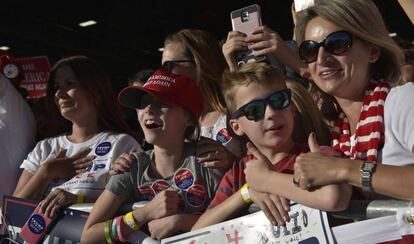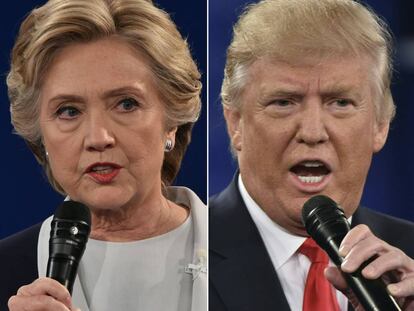How the fury of the presidential campaign has ripped the US apart
The country’s national demons, racism and sexism, have surfaced during this long and virulent journey

The United States is looking at itself in the mirror, and the image that’s looking back is far from friendly. Its national demons, those of racism and sexism, surfaced during the long months of this virulent electoral campaign. Every presidential election – including Tuesday’s contest, when Democrat Hillary Clinton will face Republican candidate Donald Trump – is a form of collective psychoanalysis, the compass that indicates where society is and where it is headed.

The unpopularity of both candidates, the insults and discrediting remarks, the general discontent with the political class, the fear of racial and social rifts and warnings about an imminent apocalypse have left the country exhausted and desperate to move on.
The election of the American president is a special moment. The country not only elects the head of state and government; it also chooses its symbol, tribe leader, the man or woman whose face will hang on the walls of thousands of schools around the country, one of the strings that, like the flag and the national anthem, binds this transcontinental nation with tenuous yet unbreakable ties.
In 2008, when Democrat Barack Obama won the presidency, America offered a new symbol to the world and to itself, raising its self-esteem. For the first time, the country of slavery and segregation elected an African American man, a member of one of the nation’s most disenfranchised minorities, to the White House. The United States was in full economic recession and in the middle of fighting two wars, but it felt like it was living up to its fundamental ideals.
The GOP has nominated a candidate prone to “cruel and prideful” remarks about women, Hispanics and Muslims
The defeated candidate in that election, Republican Senator John McCain, congratulated Obama by recalling the outrage a White House invitation to Booker T. Washington, an African American civil rights leader, provoked at the beginning of the 20th century. It was then unacceptable for a black man to roam the halls of power.
“America today is a world away from the cruel and prideful bigotry of that time,” McCain said. “There is no better evidence of this than the election of an African American to the presidency of the United States.” The specter of racism – the original sin of the world’s most powerful nation – seemed to disappear.
Eight years later, McCain’s party has nominated a candidate with a propensity for “cruel and prideful” remarks about women, Hispanics and Muslims. The support the GOP candidate receives from extremist groups of the so-called alt-right, the new alternative right and old Ku Klux Klan splinter groups, has unmasked an unpleasant reality. Racism is alive and well.
And Trump – the candidate who began his campaign by calling Mexican immigrants criminals and rapists, followed up with a proposal to ban Muslims from entering the United States and concluded it by releasing a political ad with anti-Semitic undertones – has offered the world and Americans a new image of the country that many preferred not to see.

Only one other political figure is as unpopular as Donald Trump: his rival and Democratic presidential candidate Hillary Clinton. Clinton may become the first female president of the United States after 44 men held the office, but few Americans like her. Half of the nation believes her tenure would be like traveling back in time to Bill Clinton’s presidency, revisiting the nebula of investigations and suspicious that surrounded it.
In contrast to Trump’s clear and simple message, Clinton has failed to give voters an exciting plan for the country or “the vision thing” as former President George H. W. Bush, another pragmatic politician who also had difficulty articulating his goals for the future, reluctantly put it. Democrats’ strategy to mobilize voters has been warning them against the danger that Donald Trump poses to democracy.
Trump has been more strident and crossed more lines than any other serious White House contender in recent years. He has painted the United States as a country on the verge of collapse, terrorized by crime and invaded by hordes of foreigners, a global power in decline that has become the laughing stock of the rest of the world.
In 2008, when Democrat Barack Obama won the presidency, America offered a new symbol to the world
Millions of Americans, some of them minors, saw him make fun of a disabled journalist, insult women and veterans like McCain, call Clinton a criminal and promise to imprison her. Delegates at the Republican National Convention in July in Cleveland, Ohio chanting “Lock her up! Lock her up!” is not the most edifying image of a nation that wants to be a role model for the rest of the world.
“Every four years Americans give themselves information about who they are and where they are on a spectrum of tradition and aspiration that normally frames our politics,” says Marilynne Robinson, a novelist and Obama’s intellectual sparring partner.
And so it is. This election is an X-ray of the country: its obsessions, traumas, fears and hopes. This time, unlike in 2008, the United States is looking at itself in the mirror... and it does not like what it sees.
English version by Dyane Jean François.
Tu suscripción se está usando en otro dispositivo
¿Quieres añadir otro usuario a tu suscripción?
Si continúas leyendo en este dispositivo, no se podrá leer en el otro.
FlechaTu suscripción se está usando en otro dispositivo y solo puedes acceder a EL PAÍS desde un dispositivo a la vez.
Si quieres compartir tu cuenta, cambia tu suscripción a la modalidad Premium, así podrás añadir otro usuario. Cada uno accederá con su propia cuenta de email, lo que os permitirá personalizar vuestra experiencia en EL PAÍS.
¿Tienes una suscripción de empresa? Accede aquí para contratar más cuentas.
En el caso de no saber quién está usando tu cuenta, te recomendamos cambiar tu contraseña aquí.
Si decides continuar compartiendo tu cuenta, este mensaje se mostrará en tu dispositivo y en el de la otra persona que está usando tu cuenta de forma indefinida, afectando a tu experiencia de lectura. Puedes consultar aquí los términos y condiciones de la suscripción digital.








































